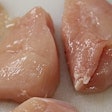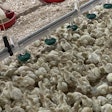The proposed rule by USDA to reduce the amount of eggs and dairy products Women, Infants and Children (WIC) recipients can receive under the program could cut egg sales by an estimated $72 million, or 1.9% of total egg sales, the department estimates. At present, WIC purchases represent 3.5% of retail eggs sold.
Under the proposal, the amount of eggs recipients can purchase with the WIC vouchers would be cut to a dozen eggs per month per person, down from the 2 to 2.5 dozen allowed now. On the dairy side, WIC recipients could substitute soy milk and tofu for dairy products.
Offsetting the cut in egg and milk vouchers would be fruits and vegetable vouchers of $8 for women, and $6 for children. Baby food vouchers in the form of fruits and vegetables would be allowed for infants.
Howard Magwire, director of government relations for the United Egg Producers, says his group is not opposed to adding fruits and vegetables, but is opposed to cutting back eggs. Eggs are a very good food source and a good bargain, he says. Magwire also says he is concerned that the WIC change could have a long-term impact on the eating patterns of low-income people. And the change would lower egg prices overall, he says.
Changing how people eat is precisely what USDA wants to do with its proposal. “We would like to see these small children from 1 to 5 exposed to more fruits and vegetables. They’re more apt to eat them later in life,” says Judy Solberg, in a Des Moines Register article. She oversees the WIC program in Iowa for the state Department of Public Health. Others, however, such as the Food Research and Action Center, contend that the Bush administration did not go far enough, and should have the program provide an additional $2 per month in fruits in vegetables over what USDA proposed.
The proposed changes—if they become the final rule—would be the most sweeping changes in the WIC program since it was created in the 1970s. At that time, the concern about poor women was that they did not consume enough protein; thus, eggs and dairy products were emphasized. Now, however, some experts contend, women get plenty of protein but need more iron, vitamin E, potassium, fiber and other nutrients, and also need more fruits and vegetables.
USDA says that trimming on eggs and dairy products for WIC recipients cuts saturated fat and cholesterol and precludes the adding of fruits and vegetables from increasing program costs.
UEP will be filing comments on the proposed rule, and urges its members to do the same. It could be a year or two before a final rule is published, depending on how big a hurry USDA is in to make changes in the program, Magwire says.
















